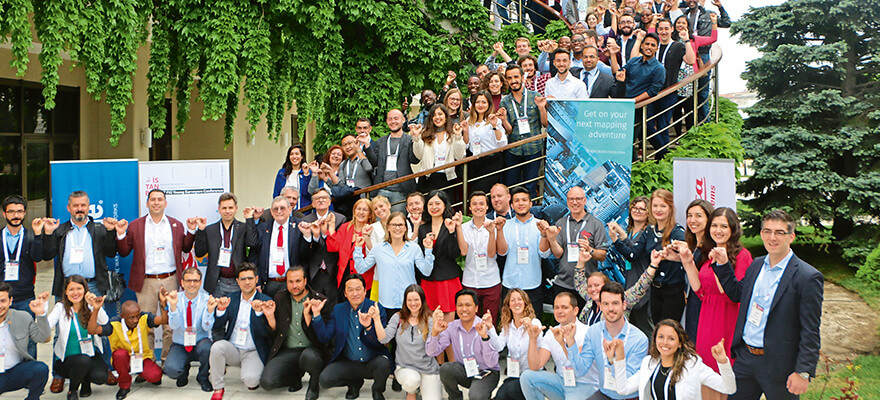Nanna Jørgensen talks to FIG vice president Diane Dumashie to hear her insights into equality, diversity and inclusion in surveying

Why is equality, diversity and inclusion (EDI) important for us
as a profession to focus on?
In simple terms, EDI is about valuing everyone in the organisation as an individual and enabling them to be themselves and performing at their best. Briefly, equality is self-explanatory; diversity is about difference and individuality; and inclusion is about creating an environment where differences are embraced and are valued.
It is clear to me that EDI positively affects the performances of an organisation, and importantly has a direct link to a key current issue in our profession that is to continue to attract the best talent. Rightly so, the pool of young people has many options to choose which profession they would like to enter.
In my view if the survey and geospatial profession can establish a true EDI culture and working environment that respects all, by stepping up our focus on promoting and truly implementing EDI we could positively differentiate, be ahead in our sector thus making us more attractive to the pool of young talent. Attracting this talent will contribute to the resilience of business, academia, and organisations and the entire profession.
You are championing the call to recognise and actively encourage EDI. What and who have inspired you?
My voice to join this call has grown over the past few years. Although material coming directly from within our profession is limited, I do have a ‘go to’ text Managing Diversity and Inclusion in the Real Estate Sector (Clack & Gabler). Inspired by leadership in my own member association (RICS), in particular Amanda Clack (RICS President 2016/17), and Anil Singh Rana FRICS, who is a trailblazer for EDI in Mauritius, I was so pleased to be invited to be a panellist on a webinar that he hosted. Since then, I’ve been using a variety of platforms to design EDI discussions to maintain exposure and hopefully influence change in our profession.
How do you see the surveying and geospatial profession working to promote EDI in the culture of our profession?
Clearly there are plenty of ways to start, but most importantly we need to dare to be frontrunners on EDI culture. We as a profession should applaud the young leaders taking action on gender and social mobility. FIG has an emerging cohort of great leaders (i.e sub 40 years of age). As you and I are talking, you’ve triggered a thought that is often overlooked and that is EDI allied to generational bias. Given we have several generations in the workplace; we have to welcome and respect all generations in this industry and to be able to learn from one another. This will ultimately help us foster positive and productive culture in our organisations.
How does the surveying and geospatial profession need to work towards attracting new talent?
Well, first acknowledging that we need to get new talent into our community and second encourage our professionals to be more technical diverse in their skills. Underpinned by the technological impetus to change regarding AI, Big Data and IoT, it will undoubtedly be the young talent that can and will lead.
In practice, we could establish more outreach programmes to primary and secondary school to secure the next generation in surveying; just as important is further and continuing professional education no matter which generation you are.
Do you see our profession helping push cultural norms and increase gender equality?
Although I have talked a lot about how talent in general ensures the resilience of our profession, a large part of our resilience also lies upon action to improve gender balance as a key element to tackling the need for the very best talent. To address the often-hidden bias against women in practice, we need to have transparency in pay, rewards and promotion so that we start implementing change to promote gender equality. Indeed, during this year, I have been holding a series of YouTube conversations with African Young Surveyors, and one of which was hearing from a dynamic Ghanaian professional about how in the land sector she pushes the cultural norms in her own country.
What tangible goals should businesses, academia, and organisations have surrounding diversity, equity and inclusion?
Moving from the talk to implementation, in practice EDI requires purposeful and concerted action from both organisations and voluntarily commitments; we all have an individual duty to transform our profession by our focused and widespread participation (Figure 1). The conversation at the FIG e-Working Week 2021 sought to open and provide visibility to the debate, and from that flowed the drafting of an actioned orientated statement devised to help member associations start that conversation within their own organisations and to influence their members.
Above all, leadership from the top to implement EDI in our organisations will need planning to ensure EDI is measurably advanced in our professional practices and organisational leadership. At FIG an EDI action statement outlines four key commitments for member organisations to focus on. That is EDI needs to be: centre staged; promoted, members mobilised; and foster and expand women’s leadership (see Figure 2).
Lastly, what closing words would you like to share?
My challenge to us all is that we take a long hard look in the mirror and ask are we diverse and inclusive? Our profession is not alone in needing to increase EDI; but with concerted action we can become the trailblazer leader for all the professions in the land and built environment sector.
Nanna Dybmose Ulrichs Jørgensen is FIG event and support assistant (www.fig.net)


